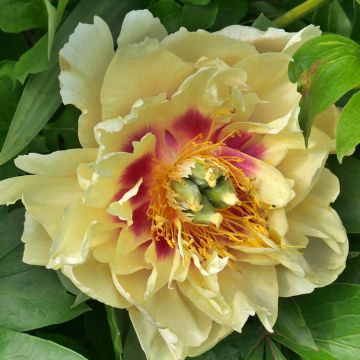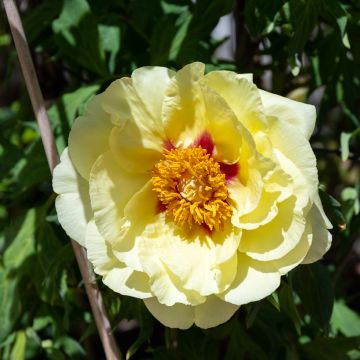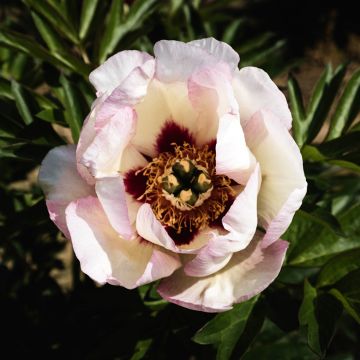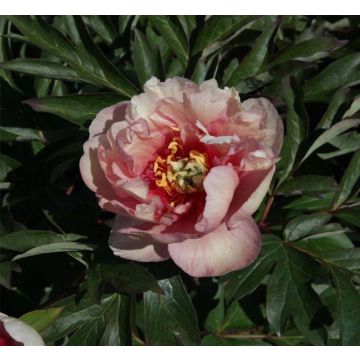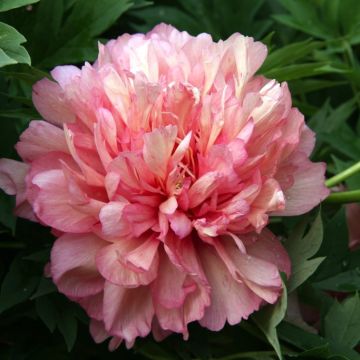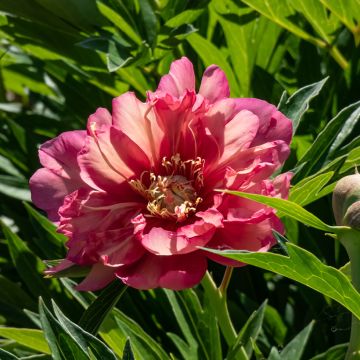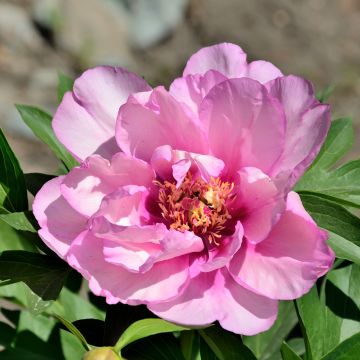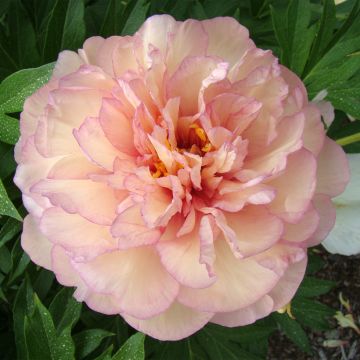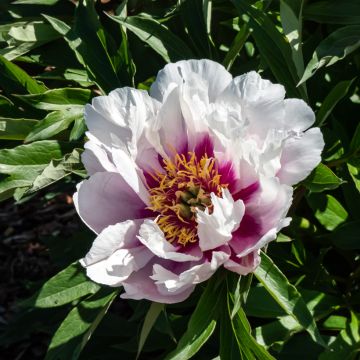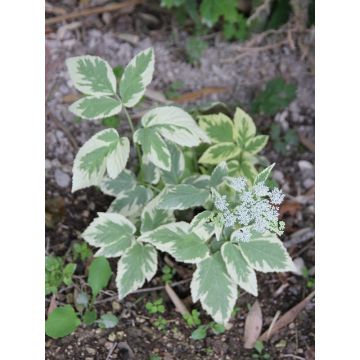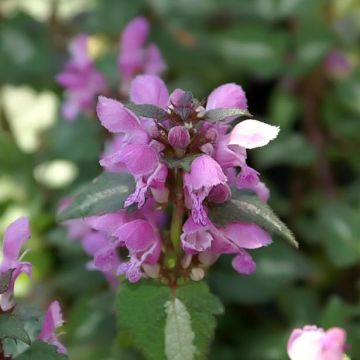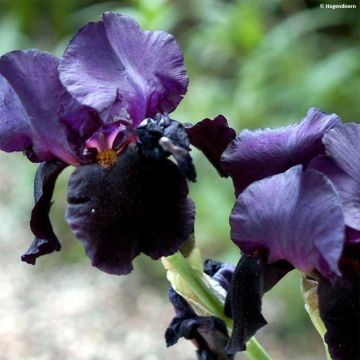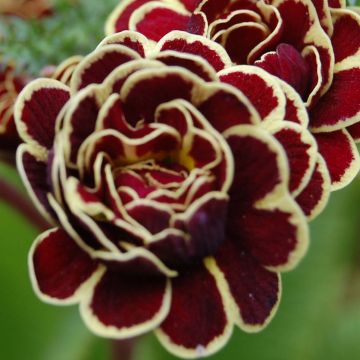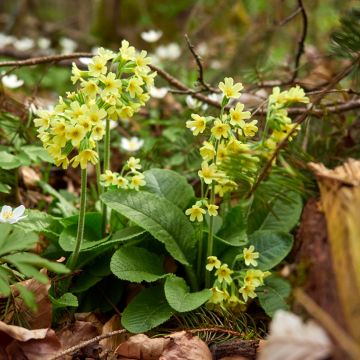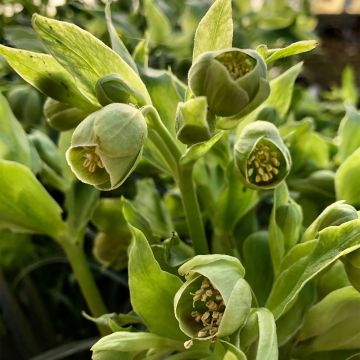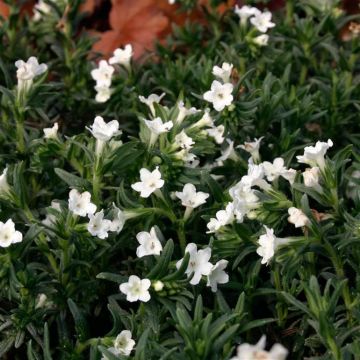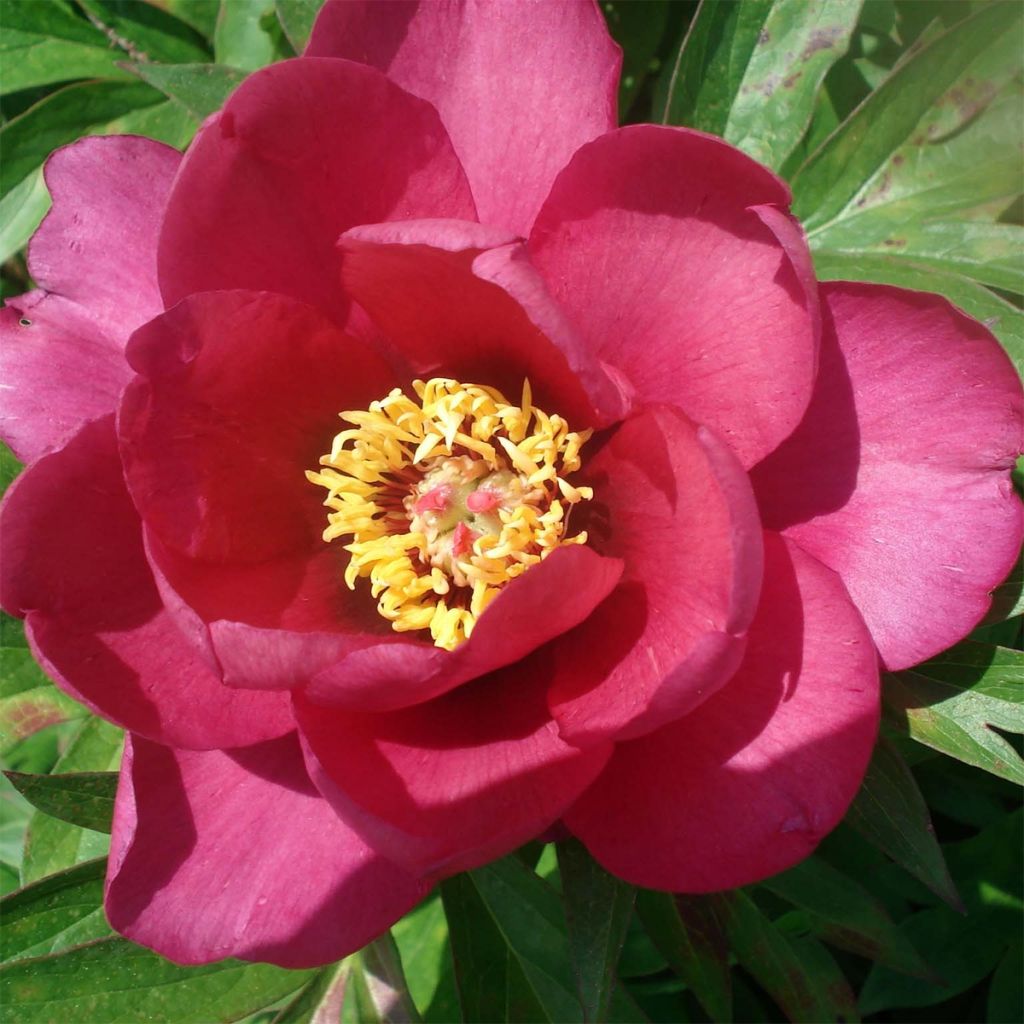

Pivoine Itoh Pink Ardour - Paeonia
Paeonia Itoh Pink Ardour
Paeonia x Itoh Pink Ardour
Itoh Peony, Intersectional Peony
This item cannot be shipped to the selected country
Delivery charge from €5.90
Delivery charge from €5.90
More information
Schedule delivery date,
and select date in basket
This plant carries a 12 months recovery warranty
More information
We guarantee the quality of our plants for a full growing cycle, and will replace at our expense any plant that fails to recover under normal climatic and planting conditions.
From €5.90 for pickup delivery and €6.90 for home delivery
Express home delivery from €8.90.
From €5.90 for pickup delivery and €6.90 for home delivery
Express home delivery from €8.90.
Does this plant fit my garden?
Set up your Plantfit profile →
Description
The Pink Ardour Itoh Peony, still rare in cultivation, belongs to a category of hybrids resulting from a cross between a tree peony and an herbaceous peony, characterised by significant growth as well as the production of sublime flowers carried on very sturdy stems that do not bend under their weight. This one is equipped with wide, semi-double flowers of a beautiful deep pink, with a lemony fragrance. This variety blooms in the middle of the season, starting in mid-May, on particularly abundant and decorative foliage.
This opulent Pink Ardour herbaceous hybrid peony belongs, like its two parents, to the Paeoniaceae family. Itoh peonies are the result of the work carried out by the Japanese breeder Toichi Itoh, starting from 1948, who bequeathed them his name. These plants, known as intersectional, are exceptional perennials that combine the qualities of herbaceous and tree peonies, combining the vigour of the former with all the splendour of the latter, in terms of both foliage and flowering.
'Pink Ardour' is a horticultural creation that is not widely distributed. The plant forms a clump reaching about 80-90 cm (32-35in) in height with a spread of 80 cm (32in), sometimes more. Its growth is rather slow, but faster than that of tree peonies. This peony develops large alternate leaves, composed of dark green and pointed leaflets. In spring the young shoots and young leaves are beautifully tinged with purple. The abundant flowering lasts for about a month, usually from May 15 to June 15. Semi-rigid leafy stems appear, carrying large buds at their tips that open into large solitary, semi-double or occasionally single flowers, measuring 17 to 20 cm (7 to 8in) in diameter, pleasantly fragrant. They are composed of 2 rows of silky petals, of a bright purple-pink colour. As they age the petals become darker at the edges. Flowers of different shades are sometimes observed on the same plant, which can produce up to 50 flowers during the season. The corolla's throat is occupied by golden yellow stamens, which provide a nice contrast. The plant disappears in winter, persisting in the form of buds (eyes) located at the soil surface.
The Pink Ardour Itoh Peony hates heavy, waterlogged soils, especially in winter, and appreciates semi-shaded locations such as the edge of a grove or the shelter of a hedge. It is an exceptional plant that deserves a prime location. It is often planted in groups of 3 specimens, in a shrub or perennial border. It forms very beautiful combinations with irises or roses, as well as catmints, foxgloves, bellflowers, lupins, columbines, or daisies. Cut peony flowers are truly wonderful in a bouquet with lilacs and bellflowers.
Tip: Herbaceous peonies should not be buried more than 3 cm (1in) deep, otherwise they will take several years to reflower.
Report an error about the product description
Paeonia Itoh Pink Ardour in pictures
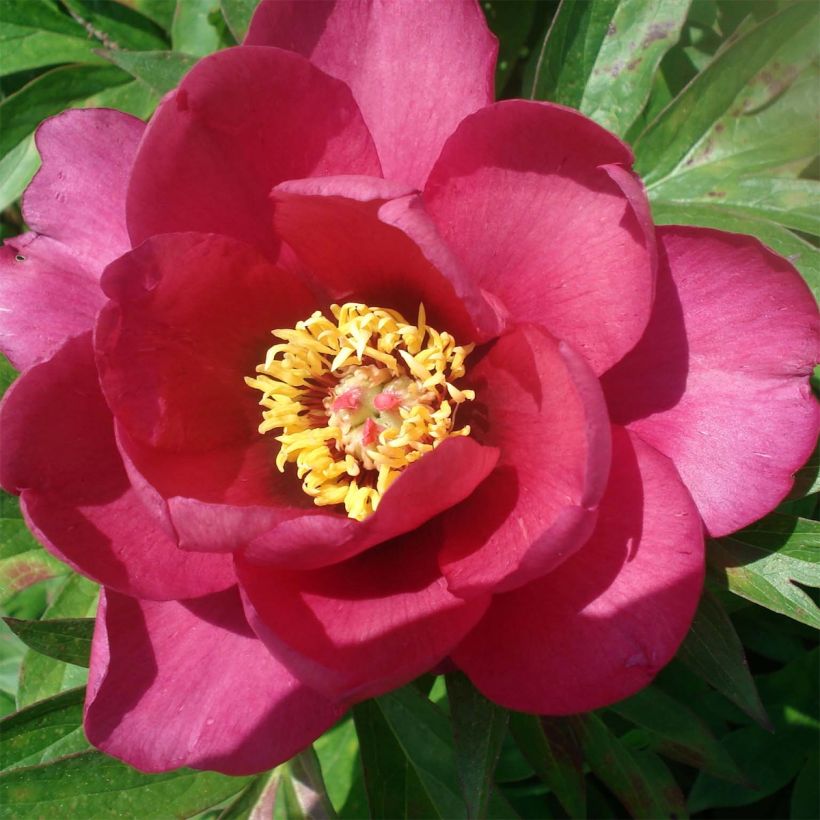

Flowering
Foliage
Plant habit
Botanical data
Paeonia
x Itoh
Pink Ardour
Ranunculaceae
Itoh Peony, Intersectional Peony
Cultivar or hybrid
Other Itoh Peonies - intersectional Peonies
Planting and care
The Itoh Pink Ardour Peony is planted from mid-September to April, allowing 80 cm (32in) spacing, in fertile, deep, humus-rich, moist, and well-drained soil. Choose a sunny but not scorching site, with partial shade in hotter southern regions. Avoid permanent mulching as it can introduce diseases, and apply rose fertiliser or compost in March. Pruning is unnecessary, but remove faded flowers and damaged parts to prevent fungal diseases. Divide old clumps in autumn only if the plant becomes overcrowded. Be careful, as it has delicate roots and dislikes being moved; following this operation it may not flower for several years. Cut the foliage to ground level between February and April or October and November. Provide a support stake for the flower stems.
Planting period
Intended location
Care
-
, onOrder confirmed
Reply from on Promesse de fleurs
Spring flowering perennials
Haven't found what you were looking for?
Hardiness is the lowest winter temperature a plant can endure without suffering serious damage or even dying. However, hardiness is affected by location (a sheltered area, such as a patio), protection (winter cover) and soil type (hardiness is improved by well-drained soil).

Photo Sharing Terms & Conditions
In order to encourage gardeners to interact and share their experiences, Promesse de fleurs offers various media enabling content to be uploaded onto its Site - in particular via the ‘Photo sharing’ module.
The User agrees to refrain from:
- Posting any content that is illegal, prejudicial, insulting, racist, inciteful to hatred, revisionist, contrary to public decency, that infringes on privacy or on the privacy rights of third parties, in particular the publicity rights of persons and goods, intellectual property rights, or the right to privacy.
- Submitting content on behalf of a third party;
- Impersonate the identity of a third party and/or publish any personal information about a third party;
In general, the User undertakes to refrain from any unethical behaviour.
All Content (in particular text, comments, files, images, photos, videos, creative works, etc.), which may be subject to property or intellectual property rights, image or other private rights, shall remain the property of the User, subject to the limited rights granted by the terms of the licence granted by Promesse de fleurs as stated below. Users are at liberty to publish or not to publish such Content on the Site, notably via the ‘Photo Sharing’ facility, and accept that this Content shall be made public and freely accessible, notably on the Internet.
Users further acknowledge, undertake to have ,and guarantee that they hold all necessary rights and permissions to publish such material on the Site, in particular with regard to the legislation in force pertaining to any privacy, property, intellectual property, image, or contractual rights, or rights of any other nature. By publishing such Content on the Site, Users acknowledge accepting full liability as publishers of the Content within the meaning of the law, and grant Promesse de fleurs, free of charge, an inclusive, worldwide licence for the said Content for the entire duration of its publication, including all reproduction, representation, up/downloading, displaying, performing, transmission, and storage rights.
Users also grant permission for their name to be linked to the Content and accept that this link may not always be made available.
By engaging in posting material, Users consent to their Content becoming automatically accessible on the Internet, in particular on other sites and/or blogs and/or web pages of the Promesse de fleurs site, including in particular social pages and the Promesse de fleurs catalogue.
Users may secure the removal of entrusted content free of charge by issuing a simple request via our contact form.
The flowering period indicated on our website applies to countries and regions located in USDA zone 8 (France, the United Kingdom, Ireland, the Netherlands, etc.)
It will vary according to where you live:
- In zones 9 to 10 (Italy, Spain, Greece, etc.), flowering will occur about 2 to 4 weeks earlier.
- In zones 6 to 7 (Germany, Poland, Slovenia, and lower mountainous regions), flowering will be delayed by 2 to 3 weeks.
- In zone 5 (Central Europe, Scandinavia), blooming will be delayed by 3 to 5 weeks.
In temperate climates, pruning of spring-flowering shrubs (forsythia, spireas, etc.) should be done just after flowering.
Pruning of summer-flowering shrubs (Indian Lilac, Perovskia, etc.) can be done in winter or spring.
In cold regions as well as with frost-sensitive plants, avoid pruning too early when severe frosts may still occur.
The planting period indicated on our website applies to countries and regions located in USDA zone 8 (France, United Kingdom, Ireland, Netherlands).
It will vary according to where you live:
- In Mediterranean zones (Marseille, Madrid, Milan, etc.), autumn and winter are the best planting periods.
- In continental zones (Strasbourg, Munich, Vienna, etc.), delay planting by 2 to 3 weeks in spring and bring it forward by 2 to 4 weeks in autumn.
- In mountainous regions (the Alps, Pyrenees, Carpathians, etc.), it is best to plant in late spring (May-June) or late summer (August-September).
The harvesting period indicated on our website applies to countries and regions in USDA zone 8 (France, England, Ireland, the Netherlands).
In colder areas (Scandinavia, Poland, Austria...) fruit and vegetable harvests are likely to be delayed by 3-4 weeks.
In warmer areas (Italy, Spain, Greece, etc.), harvesting will probably take place earlier, depending on weather conditions.
The sowing periods indicated on our website apply to countries and regions within USDA Zone 8 (France, UK, Ireland, Netherlands).
In colder areas (Scandinavia, Poland, Austria...), delay any outdoor sowing by 3-4 weeks, or sow under glass.
In warmer climes (Italy, Spain, Greece, etc.), bring outdoor sowing forward by a few weeks.

































